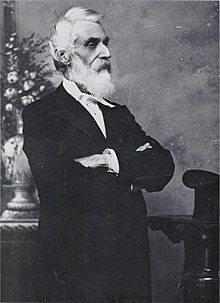Walter Murray Gibson
| Walter M. Gibson | |
|---|---|

Photo of Walter M. Gibson
|
|
| Prime Minister of Hawaii | |
|
In office June 30, 1886 – October 13, 1886 |
|
| Monarch | Kalākaua |
| Preceded by | Celso Caesar Moreno |
| Succeeded by | William C. Wilder |
| Minister of Foreign Affairs | |
|
In office May 20, 1882 – June 30, 1886 |
|
| Monarch | Kalākaua |
| Preceded by | William L. Green |
| Succeeded by | Robert J. Creighton |
| Minister of the Interior | |
|
In office June 30, 1886 – October 13, 1886 |
|
| Monarch | Kalākaua |
| Preceded by | Charles T. Gulick |
| Succeeded by | Luther Aholo |
| Minister of Foreign Affairs | |
|
In office October 13, 1886 – July 1, 1887 |
|
| Monarch | Kalākaua |
| Preceded by | Robert J. Creighton |
| Succeeded by | Godfrey Brown |
| Personal details | |
| Born | March 6, 1822 |
| Died | January 21, 1888 San Francisco, California |
| Resting place | Hawaii |
| Nationality | Kingdom of Hawaii |
| Political party | National |
| Signature | |
Walter Murray Gibson (March 6, 1822 – January 21, 1888) was an American adventurer and a government minister in the Kingdom of Hawaii prior to the kingdom's 1887 constitution.
Gibson was generally thought to be born March 6, 1822, in the southern United States, though he sometimes claimed to have been born in England. He was the captain of a ship and became involved in gunrunning in the Caribbean. Later, he was jailed in the East Indies by the Dutch on charges of fomenting rebellion, but managed to escape from his prison in Java. In 1859, he went to Utah Territory and joined The Church of Jesus Christ of Latter-day Saints (LDS Church), persuading church president Brigham Young to allow him to establish a Mormon colony in the Pacific.
Gibson arrived in the Hawaiian Islands in 1861, and founded a colony among Mormons already in the islands. He purchased land on the island of Lanai with funds from the colony in his own name, but was excommunicated after an LDS Church investigation regarding accusations of preaching false doctrine, maladministration of the colony, and embezzlement of church funds. Upon excommunication, he expelled those who did not support him from his colony and church and began angling for secular political office and power.
In 1873, Gibson started his own newspaper to extol his virtues in English and Hawaiian called the Nuhou. He successfully ran for the House of Representatives in 1878 as a candidate of the King's Party, allying himself with King Kalakaua and portraying himself as the "voice of Hawaiians". In 1880 he bought the Pacific Commercial Advertiser (now the Honolulu Advertiser). In 1882, he was appointed Minister of Foreign Affairs, and then on June 30, 1886, prime minister of the Kingdom of Hawaii by King Kalākaua. He also served on various boards, as Attorney General, Minister of Interior, and Secretary of War.
...
Wikipedia
